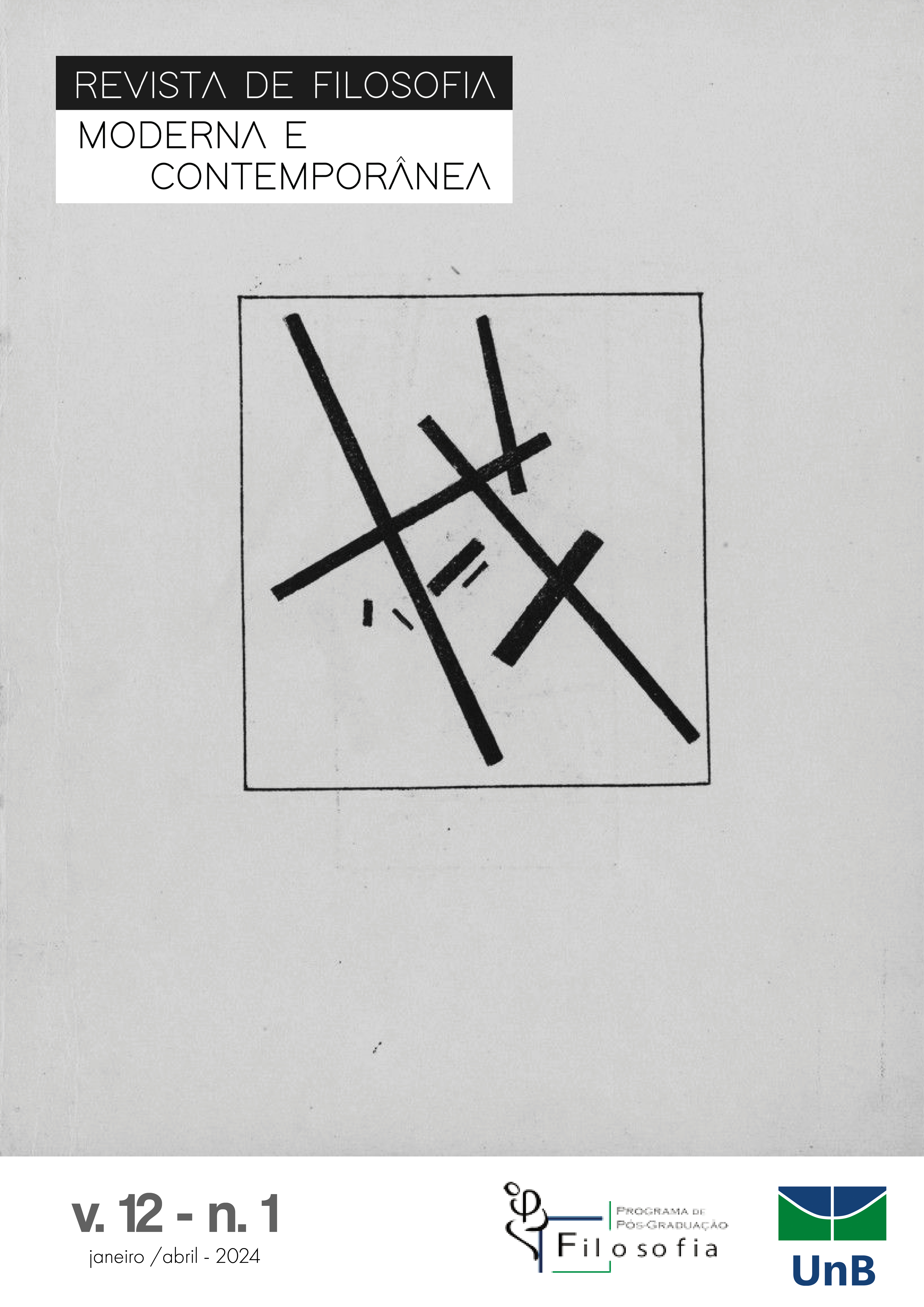Democracia, consenso e representação
notas sobre a construção da esfera pública em Jacques Rancière e seu contraste com a democracia consensual
DOI:
https://doi.org/10.26512/rfmc.v12i1.53418Palavras-chave:
Democracia. Consenso. Esfera-pública. RancièreResumo
O cerceamento do debate político por meio de imposições consensuais tem gerado uma esfera pública empobrecida, na qual as vozes divergentes são silenciadas ou subjugadas em nome da legitimidade do consentimento entre as partes. Além disso, a ênfase excessiva na representação política como a única forma legítima de participação democrática tem contribuído para o enfraquecimento da comunidade, uma vez que a representação tende a privilegiar certos interesses e grupos dominantes, silenciando as vozes dos cidadãos comuns. Com isso, um dos problemas que abordaremos é se a esfera pública contemporânea ainda existe em um cenário democrático restrito por imposições consensuais e de representação. Logo, ao examinar as teses de Jacques Rancière acerca da constituição da esfera pública e a partir de sua crítica ao conceito de consenso, as considerações de nosso artigo procuram identificar os limites e as implicações que afetam a comunidade democrática contemporânea.
Downloads
Referências
CENTRO de Promoção de Agentes de Transformação (CEPAT). “Há muito pouca democracia”. Entrevista com Jacques Rancière. Instituto Unisinos Humanitas, 11 mar. 2020. Disponível em: http://www.ihu.unisinos.br/78-noticias/596961-ha-muito-pouca-democracia-entrevista-com-jacques-ranciere. Acesso em: 17 maio 2023.
DOERR, Nicole. Entre Habermas y Rancière: la democracia de la traducción política. Transversal Texts, jun. 2013. Disponível em: https://transversal.at/transversal/0613/doerr/es. Acesso em: jun. 2023.
FEOLA, Michael. Excess Words, Surplus Names: Rancière and Habermas on Speech, Agency, and Equality. Journal of French and Francophone Philosophy | Revue de la philosophie française et de langue française, v. 27, n. 2, p. 32-53, 2019. DOI: https://doi.org/10.5195/jffp.2019.889.
HABERMAS, Jürgen. O discurso filosófico da modernidade. Lisboa: D. Quixote, 2012.
LONGMAN, Gabriela.; VIANA, Diego. Rancière: “A política tem sempre uma dimensão estética”. Revista Cult, São Paulo, 2010. Disponível em: https://revistacult.uol.com.br/home/entrevista-jacques-ranciere/. Acesso em: 17 maio 2023.
MAISSIN, Gabriel. La philosophie de l’émancipation chez Jacques Rancière. Revue Politique, 1 jun. 2004. Disponível em: https://www.revuepolitique.be/la-philosophie-de-lemancipation-chez-jacques-ranciere/. Acesso em: 24 jun. 2023.
NATÉRCIA, Flávia. Entrevista: Jacques Rancière. Revista Cult, São Paulo, 2005. Disponível em: http://cienciaecultura.bvs.br/scielo.php?script=sci_arttext&pid=S0009-67252005000400011. Acesso em: 24 jun. 2023.
POIRIER, Nicolas. Entretien avec Jacques Rancière. Cairn.info, 2000. Disponível em: https://www.cairn.info/revue-le-philosophoire-2000-3-page-29.htm. Acesso em: 24 jun. 2023.
RANCIÈRE, Jacques. Politics, Identification, and Subjectivization. October, v. 61, The Identity in Question, p. 58-64, Summer, 1992. DOI: https://doi.org/10.2307/778785.
RANCIÈRE, Jacques. O dissenso. Arte pensamento: ensaios filosóficos e políticos. 1996a. Tradução de Paulo Neves. Disponível em: https://artepensamento.ims.com.br/item/o-dissenso/. Acesso em: 4 jun. 2023.
RANCIÈRE, Jacques. O desentendimento: política e filosofia. São Paulo: Editora 34, 1996b.
RANCIÈRE, Jacques. Comment and responses. Theory & Event, v. 6, n. 4, 2003. DOI: https://dx.doi.org/10.1353/tae.2003.0017.
RANCIÈRE, Jacques. Democracy, Republic, Representation. Constellations, v. 13, n. 3, p. 297-307, 2006. DOI: https://doi.org/10.1111/j.1467-8675.2006.00402.x.
RANCIÈRE, Jacques. Nossa ordem policial: o que pode ser dito, visto e feito. Urdimento, v. 2, n. 15, p. 81-90, 2010. DOI: https://doi.org/10.5965/1414573102152010081.
RANCIÈRE, Jacques. Chronicles of consensual times. Nova York: Continuum, 2010b.
RANCIÈRE, Jacques. The thinking of dissensus: politics and aesthetics. In: BOWMAN, Paul; STAMP, Richard (Ed.). Reading Rancière. London: Continuum International Publishing Group, 2011, pp. 1-17.
RANCIÈRE, Jacques. O ódio à democracia. São Paulo: Boitempo, 2014.
RANCIÈRE, Jacques. Da partilha do sensível e das relações que estabelece entre política e estética. Territórios de Filosofia, tradução de Aurora Baêta, 2015. Disponível em: https://territoriosdefilosofia.wordpress.com/2015/10/16/da-partilha-do-sensivel-e-das-relacoes-que-estabelece-entre-politica-e-estetica-jacques-ranciere/. Acesso em: 24 jun. 2023.
RANCIÈRE, Jacques. O desentendimento: política e filosofia. 2ª ed. São Paulo: Editora 34, 2018.
RANCIÈRE, Jacques. Quem é o sujeito dos Direitos do Homem? Traduação Jonathan Marcel Scholz; Revisão e Adaptação André Fabiano Voigt. Princípios: Revista de Filosofia, v. 26, n. 50, p. 419-436, 2019. DOI: https://doi.org/10.21680/1983-2109.2019v26n50ID17909.
RUSSELL, Matheson; MONTIN, Andrew. The Rationality of Political Disagreement: Rancière’s Critique of Habermas. Constellations, v. 4, n. 22, p. 543-554, set. 2015. DOI: https://doi.org/10.1111/1467-8675.12174.
TEIXEIRA, Michelly Alves. Arte e política: a “partilha do sensível” em Jacques Rancière. 2022. 140 f. Dissertação (Mestrado em Filosofia) — Universidade de Brasília, Brasília, 2022. Disponível em: http://repositorio.unb.br/handle/10482/44721. Acesso em: 16 nov. 2023.
TEIXEIRA, Michelly Alves. O Conceito de “Partilha do Sensível” e as suas Implicações no que Concerne a Atividade Política em Jacques Rancière. Revista de Filosofia Moderna e Contemporânea, v. 10, n. 1, p. 297–308, 2022. DOI: https://doi.org/10.26512/rfmc.v10i1.47774.
Downloads
Publicado
Edição
Seção
Licença
Copyright (c) 2024 Revista de Filosofia Moderna e Contemporânea

Este trabalho está licenciado sob uma licença Creative Commons Attribution-NonCommercial-NoDerivatives 4.0 International License.
Direitos Autorais para artigos publicados nesta revista são do autor, com direitos da primeira publicação para a revista. Em virtude dos artigos aparecerem nesta revista de acesso público, os artigos são de uso gratuito, com atribuições próprias, em aplicações educacionais e não-comerciais.


